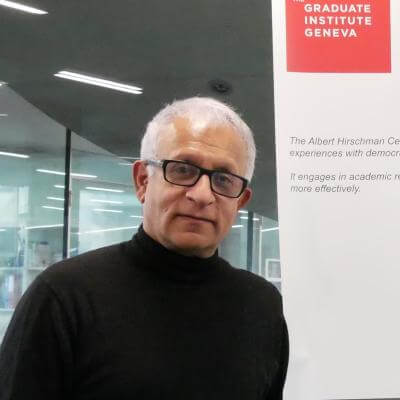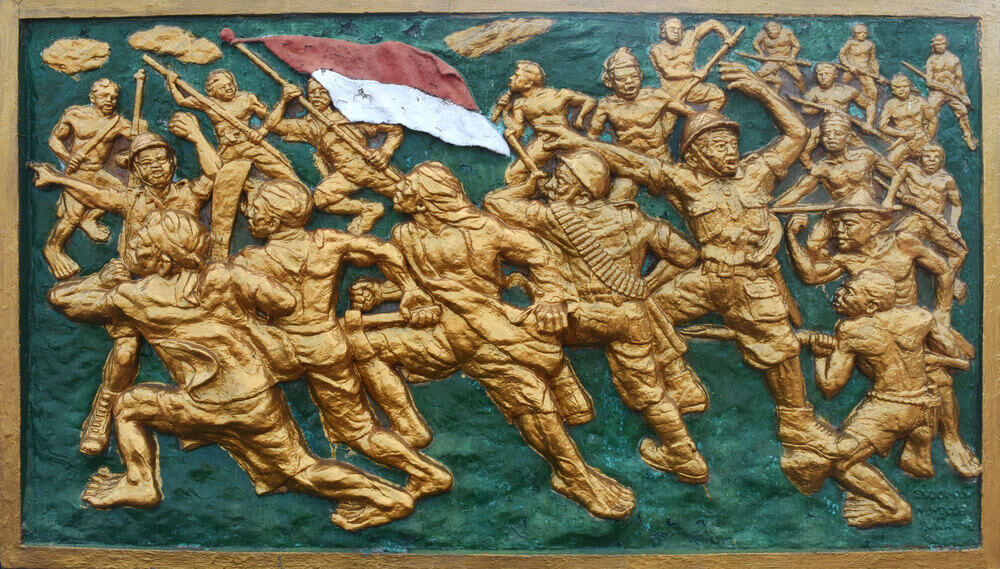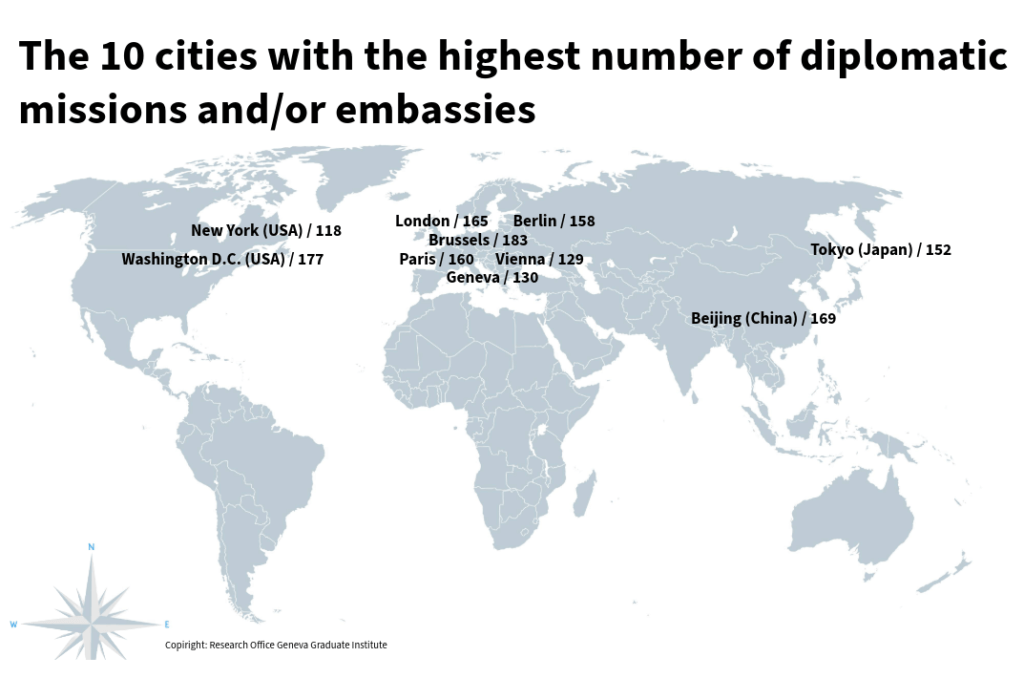Diplomacy and Decolonisation
https://doi.org/10.71609/iheid-w7g4-9850It is tempting to see diplomacy as the peaceful pursuit of a sovereign state’s interests in relations with foreign states. Yet it can be instructive to set this view in perspective. Before decolonisation, diplomacy was largely an affair conducted in high-domed chancelleries of imperial capitals by men from a thin white upper crust. Decolonisation brought to this stage leaders of anticolonial movements, many freshly emerged from jails or jungles. Their path had been difficult and bloody. As Congo and Palestine both remind us, despite distances of time and space, much blood was shed because colonial powers were determined to fashion postcolonial interlocutors and settlements acceptable to themselves. Diplomacy in such colonial wars might equally be about burying the evidence with the bodies.
To speak of diplomacy and decolonisation is thus inevitably to dwell on their ironies and paradoxes. Colonies were not sovereign and diplomacy in the conventional sense had to wait until they became sovereign at least in a de jure sense. Pitfalls littered this path. Colonial powers regarded sovereignty as a gift rather than a right, guarding it jealously, refusing to admit colonies to the jurisdiction of international law, and managing their affairs under municipal or imperial law. Any colonies developing an international personality before the 1950s did so under imperial tutelage. Politicians and colonial bureaucrats, rather than diplomats, negotiated independence, and since protecting the interests of the departing power was the main precondition, independence necessarily meant scrambling the boundaries of domestic and foreign, of what constituted the inside and what lay outside, to produce a bilateral middle space of postimperial privilege.Diplomacy in colonial wars was often about burying the evidence with the bodies. To speak of diplomacy and decolonisation is thus inevitably to dwell on their ironies and paradoxes.
Colonial powers went to great lengths to protect this space and privilege, for instance interposing themselves in relations between former colonies and the rest of the world through arrangements like the sterling area and the franc zone, and seeking to naturalise it through institutions like the Commonwealth or nebulous notions like Françafrique. France’s relations with its ex-colonies were managed until the late 1990s by the former Ministry of Overseas France, renamed Ministry of Cooperation in 1961, not its foreign office, and Britain’s by the Commonwealth Office until its merger with the Foreign Office in 1968 to form what is still today the Foreign, Commonwealth and Development Office.
A Commonwealth shrivelling before our eyes might seem a vainglorious symbol of a vanished era. Yet, despite failing in its pretence that the empire was a free association of countries under the Crown, Britain’s efforts to limit postcolonial sovereignty through the Commonwealth found an outlet in the diplomatic sphere. In a practice dating from the colonial period, Commonwealth representatives in one another’s countries continue to be called high commissioners, rather than ambassadors. Embassies are likewise high commissions. It even remained moot for a time whether they were entitled to diplomatic privileges and immunities. For instance, suspecting the sympathies of the Indian commissioner in Nairobi, Apa Pant, Kenya’s colonial police repeatedly raided his home in the early 1950s to hunt for anticolonial activists, and once to rough him up for hosting the well-known British socialist and antiwar campaigner Fenner Brockway. The grey zone high commissioners occupy in the diplomatic sphere is reflected in their omission in Article 14 of the 1961 Vienna Convention on Diplomatic Relations, where only “ambassadors or nuncios” are recognised as “heads of mission”, in addition to sundry “other heads of mission of equivalent rank”. If the difference between ambassadors and high commissioners nevertheless appears merely symbolic today, it is because Britain’s illusions of the Commonwealth turning into a pocket borough for shoring up its declining power and influence did not long survive encounter with reality, not least the resistance of its former colonies.Though the United Nations was founded as an adjunct to empire, it was where newly independent countries made their diplomatic mark.
Setting aside the tender susceptibilities of imperial plenipotentiaries, the United Nations was where the newly independent countries quickly made their diplomatic mark. The UN was not founded to dismantle colonialism. Rather, many, like Jan Smuts, the white supremacist South African prime minister responsible for the UN charter’s lofty preamble, believed the UN would function as an adjunct to empire and cement the values that his country, “a little epic of European civilization on a dark continent”, represented in Africa. Yet Smuts suffered two stinging defeats at the hands of the “darker nations” in the very first session of the UN General Assembly (UNGA), which rejected his plan to annex South West Africa (a League mandate under South African control) and passed a resolution criticising his country’s treatment of its Indian population. This resolution was one of the earliest international condemnations of South Africa’s racial policies.
By 1950, there was an active Asian caucus at the UN, followed after the landmark Bandung Conference by an Afro-Asian caucus and in 1958 by an African grouping. The 1960 UNGA resolution on decolonisation was a concerted expression of this emergent “third world”. Other milestones, and setbacks, followed in the 1960s and 1970s, reflecting newly independent countries’ aspirations, and their savvy public and collective diplomacy, to advance decolonisation and build a new, more equitable world, and the unrelenting, and often violent, resistance of the colonial powers. The struggle continues.
Electronic reference
Balachandran, Gopalan. “Diplomacy and Decolonisation.” Global Challenges, no. 17, May 2025. URL: https://globalchallenges.ch/issue/17/diplomacy-and-decolonisation. DOI: https://doi.org/10.71609/iheid-w7g4-9850.Dossier produced by the Research Office of the Geneva Graduate Institute.
TABLE | The 20 Countries with the Most Diplomatic Missions in the World in 2024
| Country | Total number of posts | Embassies | Consulates | Permanent Missions | Other representations |
|---|---|---|---|---|---|
| China | 274 | 173 | 91 | 8 | 2 |
| USA | 271 | 168 | 83 | 11 | 8 |
| Turkey | 252 | 145 | 93 | 12 | 2 |
| Japan | 251 | 152 | 66 | 10 | 23 |
| France | 249 | 158 | 72 | 18 | 1 |
| Russia | 230 | 143 | 74 | 10 | 3 |
| UK | 225 | 156 | 51 | 11 | 7 |
| Germany | 217 | 148 | 56 | 11 | 2 |
| Italy | 206 | 124 | 74 | 8 | 0 |
| Brazil | 205 | 135 | 58 | 12 | 2 |
| India | 201 | 142 | 50 | 5 | 4 |
| Spain | 190 | 114 | 65 | 10 | 1 |
| South Korea | 187 | 114 | 60 | 5 | 8 |
| Mexico | 161 | 80 | 71 | 8 | 2 |
| Canada | 157 | 98 | 38 | 11 | 10 |
| Argentina | 150 | 87 | 54 | 7 | 2 |
| Netherlands | 149 | 106 | 28 | 10 | 5 |
| Switzerland | 141 | 102 | 30 | 7 | 2 |
| Hungry | 140 | 87 | 43 | 7 | 3 |
| Poland | 135 | 91 | 33 | 9 | 2 |
All data taken from the Lowy Institute’s Global Diplomacy Index 2024.
BOX 1 | Diplomatic Realism
Diplomatic realism, often simply referred to as realism, is a theory of international relations that emphasises the competitive and conflictual nature of relations between States. Here are some key principles of diplomatic realism:
- International anarchy: The international system is anarchic, meaning that there is no higher authority to regulate relations between States. States must therefore rely on their own means to ensure their security and interests.
- State sovereignty: States are the main actors in international relations. They are sovereign and act rationally to maximise their security and power.
- Power and national Interests: States seek to maximise their relative power in relation to other states. Power can be measured in terms of capabilities — military, economic, technological, etc. National interests, often defined in terms of security, survival and prosperity, guide the actions of States.
- Balance of power: States form alliances and adopt strategies to maintain a balance of power, thus preventing a single State or coalition of States from becoming too powerful and threatening their security.
- Inevitable conflict: Realists consider conflict to be an inevitable feature of international relations. States are in constant competition for resources, territory and influence, which can lead to conflict and war.
- Pessimism about cooperation: Realists are sceptical about the possibility of lasting international cooperation. They see international institutions and agreements as tools that States use to promote their national interests rather than as means of genuine cooperation.
Diplomatic realism has been influenced by thinkers such as Thucydides, Machiavelli, Hobbes, and more recently by modern theorists such as Hans Morgenthau and Kenneth Waltz. This theory provides a framework for understanding the behaviour of States in a world where security and survival are of paramount concern. This realist theory is one of the analytical frameworks for international relations, in addition to liberalism and constructivism. They all have in common that they are rooted in Western philosophy.
Source: David Ho, “Les théories chinoises des relations internationales: une brève introduction”, La Revue d’histoire militaire, 4 April 2024.
BOX 2 | The New Diplomacy
“New diplomacy” refers to an evolution in traditional diplomatic practices, marked by the emergence of new actors, new means of communication and new issues. It is a concept that has emerged in response to the challenges and opportunities of the 21st century, marked by globalisation and the growing interdependence of states. It contrasts with traditional diplomacy, which is state-based, secret and bilateral, embodied by foreign ministries and embassies.
- Expansion of diplomatic actors: While traditional diplomacy was monopolised by states, new diplomacy involves multiple actors. It includes non-governmental organisations (NGOs), multinational companies, local authorities (cities, regions), international organisations (UN, WTO, EU…), citizens and social movements.
- Transformation of tools and channels: Digital tools have profoundly changed diplomatic practices. Public diplomacy and “twiplomacy” (diplomacy via X and other networks) enable direct communication between diplomats and the public.
- Broadening of themes: The new diplomacy addresses complex global issues such as climate change, global health, human rights, migration, digital governance and gender equality. For instance, the climate negotiations at COP26 involved not only states, but also NGOs, businesses, indigenous peoples and young activists such as Greta Thunberg.
- Collaborative and multi-level approaches: Diplomacy is no longer just vertical (between governments), but also horizontal, via cooperation networks between cities (e.g. C40 Cities), universities and civil society.
- More transparent and responsive diplomacy. Negotiations are increasingly subject to pressure from public opinion, the media and real-time communication dynamics. This makes diplomacy more visible, but also more vulnerable to polarisation or communication effects.
In summary, new diplomacy is a more holistic and integrated approach to international relations that recognises the complexity and interdependence of the modern world. It seeks to address global challenges through cooperation, engagement with a diversity of actors, and the use of new tools and technologies.
BOX 3 | Figures on International Geneva and Impact of US Cuts on United Nations Funding
- 43 international organisations in the Lake Geneva area (38 in Geneva, 46 in total in Switzerland)
- 183 States represented
- About 750 non-governmental organisations (NGOs)
- More than 4,000 visits per year of heads of state and government, ministers and other dignitaries
- In 2024, 36,460 people were employed in IOs, NGOs and permanent missions:
- 28,962 people employed in IOs
- 4,062 people employed in permanent missions
- 3,436 people employed in NGOs
- In 2024, the United States funded 22% of the UN regular budget, more than China (15.25%) and Japan (8.03%). But in 2025, it significantly reduced its financial contributions:
- Reduction of more than 80% for the UN regular budget, affecting more than 40 international organisations, including UNESCO and the World Health Organisation (WHO)
- Suspension of USD 377 million for UNFPA, the UN agency for reproductive health, impacting 48 programmes in crisis areas such as Gaza, Sudan and Ukraine
- Cuts of USD 160 million for the UN Food and Agriculture Organization (FAO), jeopardising global efforts to monitor avian influenza
- Estimated reduction of 30% for the International Organization for Migration (IOM), affecting more than 6,000 employees worldwide.
- To prevent staff layoffs due to the US funding freeze, the Canton of Geneva has allocated CHF 10 million and the City of Geneva CHF 2 million to support local NGOs.
Sources: République et canton de Genève, “Statistiques cantonales”. République et canton de Genève, Genève internationale, “Facts and Figures”. Confédération suisse, “Facts and Figures about International Geneva”. Better World Campaign, “Proposed FY25 Spending Bill for Foreign Operations Would Gut U.S. Global Standing”, 6 April 2025. United Nations Office at Geneva, “US Funding Cuts Confirmed, Ending Lifesaving Support for Women and Girls”, 27 February 2025. Susannah Savage and Michael Peel, “American Farmers Raise Alarm As US Cuts Funds for UN Bird Flu Fight”, Financial Times, 9 May 2025. International Organization for Migration, “Update on IOM Operations amid Budget Cuts ”, 18 March 2025. US Library of Congress, Congressional Research Service, United Nations Issues: US Funding to the UN System, by Luisa Blanchfield, IF10354, 9 April 2024. Frédéric Julliard, “Genève souffle le chaud et le froid sur les ONG”, Le Temps, 17 February 2025. Fanny Scuderi, “La ville de Genève alloue 2 millions de francs d’aide aux ONG”, 13 March 2025.
VIDEO | Former US Representative to the UN Amb. Sheba Crocker on Her Three Years in International Geneva
U.S. Mission Geneva
VIDEO | Diplomacy Today, with Stephan Klement, EU Diplomat and Special Adviser on Iran Nuclear Issue
Research Office, Geneva Graduate Institute
PODCAST | La diplomatie de la restitution des œuvres d’art avec Amb. Angelo Dan
Research Office, Geneva Graduate Institute
















